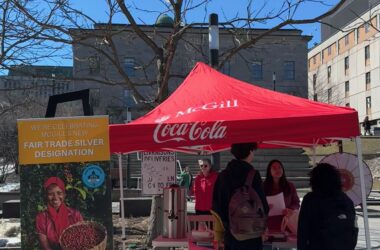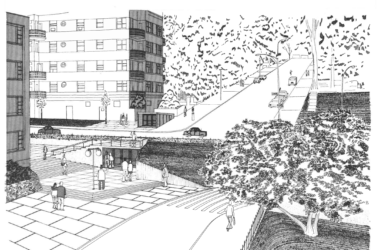In March 2018, the University Centre, commonly known among students as the “SSMU Building,” closed for much-needed renovations. While the building was scheduled to open by the end of that year, this date has been pushed back to April 2020, 16 months past the initial deadline. During this two-year period, the loss of this crucial space has forced multiple student-run collectives, clubs, and services to relocate.
The issue of communicating disruptions to student events started to surface weeks before the building was set to close. On Feb. 12, 2018, a preparatory inspection showing a high level of asbestos in the Players’ Theatre’s office caused an unexpected closure of the space. along with major disruptions to the McGill Drama Festival, which was being held at the time. Cheyenne Cranston, Players’ Theatre event coordinator, expressed her disapproval of the lack of forewarning surrounding this problem in an interview with the The McGill Tribune.
“Our biggest concern is [why] this wasn’t made an issue before we had 50 students working months to put on this show,” Cranston said.
The need for student-run collectives to adapt with insufficient resources continues to be a problem, as highlighted by the problems Midnight Kitchen, McGill’s own food collective, has faced. With a goal of providing affordable food as well as a space to congregate and work against food insecurity, the club has unique needs which, according to Midnight Kitchen coordinator Leah Freedman, remain unmet.
“We needed an industrial kitchen on campus, and we never found that,” Freedman said. “We only have an industrial kitchen in Saint-Henri [….] We’re doing a good job keeping up, but [our service] is really limited.”
Other clubs have had to contend with limitations, such as the lack of wheelchair accessibility in 3471 Peel, which houses many organizations such as the Peer Support Centre and Walksafe. Other issues, such as the lack of on-campus spaces for large events, storage space for equipment, gender-neutral washrooms, and the lack of communication with clubs regarding delays, suggest a greater problem of the administration’s handling of the University Centre closure.
“It feels like [the clubs] are taken out of the conversation, and we are being deprioritized,” Freedman said. “In my opinion, McGill doesn’t want [community] spaces to exist, because it’s not in their best interest, which is profit.”
Freedman further explains that the deprioritization of these community spaces by the administration impacts the organizing culture of the university. These locations, which are coined as “third places” by sociologist Ray Oldenburg, are breeding grounds for social connections, inclusion, and democracy. While students are also able to go to other hangout spots such as cafes or bars outside campus, spaces that are driven by the community rather than profit are the most inclusive and beneficial for promoting a culture of exchanging and sharing ideas.
The University Centre was one venue where student-run organizations could share this goal of cooperation and solidarity. For McGill to better support inclusive student-run organizations, Freedman believes they must communicate and plan better.
“It would be better if they came up with a proper solution,” Freedman said. “If they would overshoot the deadline but commit to a viable solution in the meantime, that would be way [better], rather than […] push[ing] the dates.”
Students’ Society of McGill University (SSMU) President Bryan Buraga believes the solutions that McGill have provided are sufficient given the circumstances, but remains equally dismayed by the University Centre’s postponed re-opening. On SSMU’s part, they have stated that they are doing their best to accommodate student groups but there remains more requests for spaces than they have available.
Despite the ongoing dilemmas associated with the University Centre’s closure, Midnight Kitchen remain both adaptive and optimistic.
“We’re as bummed about the closure as anyone,” Midnight Kitchen wrote on the Facebook post regarding the ongoing construction. “But the forced flexibility has kept us on our toes and will likely lead to a new, revitalized perspective once we are back.”








